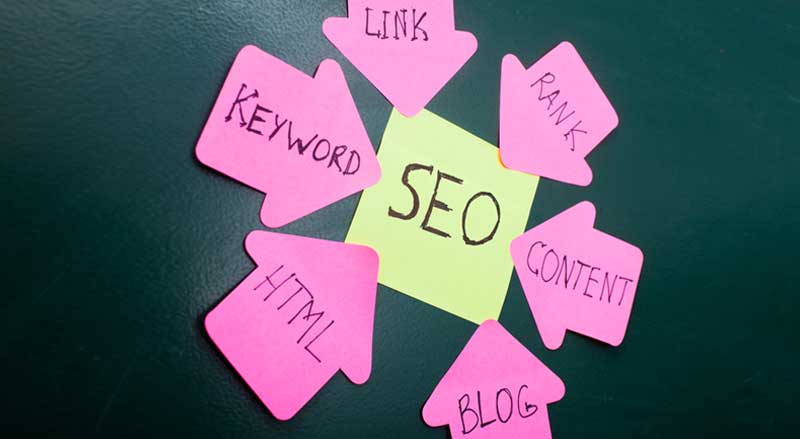You may have heard about SEO and its importance to your small business. But are you wondering:
- What exactly is SEO?
- Why do I need it?
What is SEO?
In non-technical terms, SEO (search engine optimization) is a process used to improve your website to make it more visible when people search. It helps your website get better rankings from the major search engines.
The goal of SEO is to have your website show up organically at the top of the search engine results pages (SERPs) when a person types in a search query that relates to your website or web page topic(s).
Why Do I Need an SEO?

As a small business owner, you probably know the importance of a business website: It’s always working for you 24-hours a day. So even when you’re sleeping, or up to your eyeballs in other business matters, you know your website is out there promoting your business and attracting new customers.
But there’s a catch.
What if no one is finding your website—instead they’re reading the site of your competitor across the street? This is exactly why SEO matters!
A well-optimized site will land on or near the top of your desired SERP. Your prospects will find your website first.
The search engines determine which websites and web pages best satisfy any request. You need to provide the best and most helpful information to satisfy their query. Do this well, and your prospects won’t need to look any further!
Your small business is always competing for visibility. Quality SEO will have you winning the gold!
Understanding SEO for small businesses is important. But an experienced SEO marketing expert can best navigate these challenging waters for you—and consistently deliver the winning results you desire!
Better SERP results provide more visibility and get more leads to your website. Take advantage of this increased online traffic and your business will grow. And you will have the benefit of reaching your audience at the very start of their search.
Specifics of Small Business SEO
The U.S. Small Business Administration says “most manufacturing companies with 500 employees or fewer, and most non-manufacturing businesses with average annual receipts under $7.5 million, will qualify as a small business.”
Clearly, SEO for a small business is not as complex nor as expensive as SEO for a major highly competitive corporation. But regardless of your business’s size, you will benefit from successful SEO.

Small business SEO still takes time and resources—and will take a more targeted approach. But with so many moving parts, it will be challenging for the business owner. Nevertheless, some small business owners prefer to try to manage their own SEO.
SEO is Complex
SEO can be described in simple terms, but creating a well-optimized website is far from simple—in fact, it’s quite complex.

Some non-negotiable SEO components include:
- Quality and trustworthy content
- A commitment to frequently updated content (blogs can be helpful)
- Optimized content in a reader-friendly format
- Optimized images and video
- Carefully researched keywords
- Optimized page descriptions and titles
- Helpful and working internal links
- Fast load time
- Backlinks, and more!
Using Google Analytics & Google Search Console
If you are doing your own SEO, it’s critical to have a basic understanding of Google Analytics and the Google Search Console.
Google analytics can tell you lots about the visitors to your website—it tracks up to 200 metrics. For example, you can find out:
- How many readers visit your website
- Peak visiting hours
- Which pages are visited frequently
- How long visitors stayed on your site or specific pages
- And so much more
The Google Search Console lets you follow and improve your Google search performance. Does Google like your SEO optimization or does it need to be tweaked? You’ll find out here!
Technical SEO Counts
Technical SEO is all about improving a page technically to enhance search engine ranking. And you can be sure as far as Google is concerned, technical merit counts for a lot!
The search engines want crawl your website easily and figure out what your site is all about. They also want to make sure that the user has a good experience when they visit.
Technical SEO optimization includes:
- Ensuring a fast load time
- Providing a fast user response time
- Avoiding duplicate content (search engines hate that)
- Fixing broken links to eliminate 404 error pages
- Writing accurate meta tags
- Including a robots.txt. file to help manage how robots crawl your website (best done by experienced site developers)
- Using HTTPS rather than HTTP to add an extra layer of security. Google no longer supports HTTP sites in Chrome
- Using structured data
- Providing an XML sitemap that lists all pages of your site
Create Optimized Content
Both readers and search engines want content that is original, engaging, and helpful. If you offer content from your own experience or knowledge, you will benefit by becoming a thought leader. Prospects will come to you for answers to their questions.
When creating optimized content:
- Use researched keywords
- Use compelling meta titles and descriptions that accurately tell what each page is about
- Write with quality and authority to earn valuable backlinks
- Use sentences that are easy to read and understand
Above all, amid all this SEO madness, remember you are writing for your website visitor. Content should always sound natural and be written for a human—not for a search engine.
Use your business experience to know what questions your customers usually have and provide an easy way for visitors to find answers. Provide a standard navigation bar on every page so readers don’t get lost. If they do, they will simply lose patience and go on to another website.
Optimize Videos on Your Website
Videos are a great way to showcase a product or service, introduce yourself to your audience, and enhance your website. Landing page videos should be kept short (30-60 seconds); product descriptions can be longer. Read about our award-winning videography and photography services.
A few ways to optimize a video are:
- Do keyword research
- Come up with a great title
- Use descriptive tags to help others find your video
- Avoid long introductions. And get right to the information people are looking for. The first 10 seconds really matter.
Leverage Your Social Media for Enhanced SEO
A site with quality backlinks is definitely ahead in the SEO game. Here you can read all about backlinks and how to increase your search visibility with existing social media platforms.
Hire an Expert
Evans Alliance is a New Jersey based company that is a leader in SEO, web design, social media, and other digital and traditional marketing services. Let us handle the details of promoting your unique brand. For more information, contact us.


